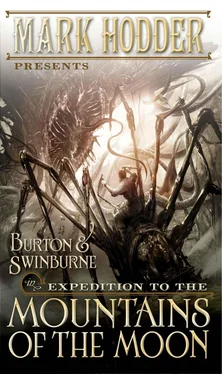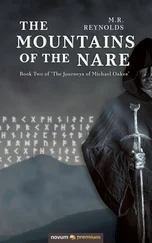Mark Hodder - Expedition to the Mountains of the Moon
Здесь есть возможность читать онлайн «Mark Hodder - Expedition to the Mountains of the Moon» весь текст электронной книги совершенно бесплатно (целиком полную версию без сокращений). В некоторых случаях можно слушать аудио, скачать через торрент в формате fb2 и присутствует краткое содержание. Жанр: sf_stimpank, на английском языке. Описание произведения, (предисловие) а так же отзывы посетителей доступны на портале библиотеки ЛибКат.
- Название:Expedition to the Mountains of the Moon
- Автор:
- Жанр:
- Год:неизвестен
- ISBN:нет данных
- Рейтинг книги:5 / 5. Голосов: 1
-
Избранное:Добавить в избранное
- Отзывы:
-
Ваша оценка:
- 100
- 1
- 2
- 3
- 4
- 5
Expedition to the Mountains of the Moon: краткое содержание, описание и аннотация
Предлагаем к чтению аннотацию, описание, краткое содержание или предисловие (зависит от того, что написал сам автор книги «Expedition to the Mountains of the Moon»). Если вы не нашли необходимую информацию о книге — напишите в комментариях, мы постараемся отыскать её.
Expedition to the Mountains of the Moon — читать онлайн бесплатно полную книгу (весь текст) целиком
Ниже представлен текст книги, разбитый по страницам. Система сохранения места последней прочитанной страницы, позволяет с удобством читать онлайн бесплатно книгу «Expedition to the Mountains of the Moon», без необходимости каждый раз заново искать на чём Вы остановились. Поставьте закладку, и сможете в любой момент перейти на страницу, на которой закончили чтение.
Интервал:
Закладка:
“You're going now?” she asks. “Supper is almost ready!”
“I am,” he replies, “but don't worry-even if I'm gone for years, I'll be back in five minutes!”
“You won't return an old man, I hope!” she grumbles, and runs a hand over her distended belly. “This one will need an energetic young father.”
He laughs. “Don't be silly. It won't take long.”
Bending, he kisses her on the nose.
He instructs the suit to take him to five-thirty on the afternoon of 10th June, 1840. Location: the upper corner of Green Park, London.
He looks at the sky.
“Am I really going to do this?” he asks himself.
“Do it!” a voice whispers in his head, and before he can consciously make a decision, he takes three long strides, jumps, hits the ground with knees bent, and leaps high into the air. A bubble forms around him and he vanishes with a small detonation, like a little clap of thunder.
Pop!
Sir Richard Francis Burton jerked awake and tepid water slopped over the edge of his bath.
He shivered, sat up, and looked around his study, trying to identify the source of the noise. His attention was drawn to a thin wisp of steam rising from a tubular contraption on one of his three desks. He reached for a towel then stood, stepped out of the bath, and wrapped the thick cloth around himself. He crossed to the desk. The glass and brass apparatus was his direct connection to the prime minister and the king. Burton retrieved a canister from it, snapped it open, and pulled out a sheet of paper. He read the words: Be prepared to receive the prime minister at 2 a. m.
“Curse the man! That's all I need!”
Pox twitched a wing and chirped, “Stink fermenter!”
Burton looked at the clock on the mantelpiece. It was half-past one.
Rapidly drying himself, he went into his dressing room and put on loose white cotton trousers and a shirt, then wrapped his jubbah -the long and loose outer garment he'd worn while on his pilgrimage to Mecca, which he now used as a night robe-over the top of them. He slid his feet into pointed Arabian slippers and wound a turban around his damp hair.
By two o'clock, the bathtub had been removed, another Manila cheroot had been smoked, and Burton had sat and pondered his strange dream. There was much about it that he didn't understand-the curious glass desk, the sparsely furnished room in which it stood, some of the words that Edward Oxford had uttered-yet it seemed vividly real.
Did I just glimpse a distant future? The one that was meant to be before Oxford interfered?
Hearing the coughing of steam engines and rumble of wheels in the street outside, he stepped to the window and looked out in time to see Lord Palmerston's armoured six-wheeled mobile castle draw up.
He went downstairs and opened the front door.
Palmerston was standing on the step, with his odd-job men Gregory Hare and Damien Burke on either side of him.
“Do you consider that suitable attire, Captain Burton?” the prime minister asked.
“For two o'clock in the morning? Yes, sir,” Burton replied, moving aside to let the men enter. “Do you consider it a suitable hour for visiting?”
“One cannot run an Empire and maintain respectable hours, sir.”
“Up to the study, if you please.”
Burton closed the door and followed them upstairs, noting that the prime minister's men were dressed, as ever, in outlandishly old-fashioned outfits.
“Last time I saw this room,” Palmerston said as he entered the bookcase lined chamber, “it was all but destroyed.”
“You're referring to the occasion when we were attacked and you hid in my storeroom?” Burton responded.
“Now, now, Captain. Let us not get off on the wrong foot.”
Palmerston placed his hat on one of the desks and took off his calfskin gloves. His fingernails were painted black. He didn't remove his tightly buttoned velvet frock coat but smoothed it down then sat in Burton's favourite saddlebag armchair and crossed his legs. He pulled a silver snuffbox from his pocket and said, “We must talk. I would have been here earlier but the streets were impassable.”
Burke and Hare each sat at a desk. Burton took the armchair opposite Palmerston, who asked, “Your expedition is equipped and ready for departure?”
“It is.”
“Good. Good. All running smoothly, then?”
“Yes. Unless you count two attempts on my life, one of which resulted in the death of my good friend Thomas Bendyshe.”
Palmerston jerked forward. “What did you say?”
“A man named Peter Pimlico tried to poison me. He was hired by a Prussian named Otto Steinruck, who then killed him by strangulation to keep him quiet. And, earlier this evening, somebody sent a bullet my way.”
Damien Burke, tall, hunchbacked, extremely bald, and sporting the variety of side whiskers known as “Piccadilly Weepers,” cleared his throat and said, “This Germanic individual, Captain Burton-did you find out anything about him?”
“Only that he's portly, wears a large moustache, has pointed claw-like fingernails, and chews Kautabak tobacco.”
Burke glanced at Gregory Hare, who was short and muscular, with white hair and a broad, pugnacious face. “Ah-ha,” he said. “Do you agree, Mr. Hare?”
“I do, Mr. Burke,” Hare answered. “Ah-ha.”
“You know something of this individual?” Burton asked.
“Yes,” Burke said. “I consider it highly likely that Otto Steinruck is not Otto Steinruck. It is almost certainly an alias. The man fits the description of a notorious Prussian spy named Count Ferdinand Graf von Zeppelin. You'll remember that last year he helped Richard Spruce and his Eugenicist colleagues to flee the country. A very dangerous man, Captain.”
Burton nodded. “And one bent on preventing me from going to Africa, it would appear. I'm certain he's still working with Spruce, too.”
“Why so?”
“The dead man had a foul-looking plant sprouting from the roof of his mouth.”
“Hmm. That's interesting.” Burke took a notebook from his pocket and scribbled something in it with a pencil.
Palmerston opened his snuffbox, took a pinch of brown powder, sprinkled it onto the back of his right hand, and raised it to his nose. He snorted it and his eyes momentarily widened.
It occurred to Burton that the prime minister's face had been stretched so taut by his Eugenicist treatments that those eyes appeared almost oriental.
“A complex situation,” Palmerston muttered. “There are great moves being made, Captain, moves that will reshape the world, and you are in the thick of it.”
“How so?”
“Tomorrow afternoon, I shall make an announcement to parliament. You'll be out of the country by then, so I came to give you the news personally. Excuse me-”
Palmerston turned his head to one side and let loose a prodigious sneeze. When he looked back, there were hundreds of deep wrinkles around his eyes and nose. Over the next few minutes, they slowly flattened out and disappeared.
“What news?” Burton asked.
“Lincoln has surrendered. America is ours.”
Burton's jaw dropped. He fell back into his seat, speechless.
“Some time ago,” Palmerston continued, “I told you that if this should occur I would demand of the Confederates the abolition of slavery as repayment for our role in their victory. I fully intend to do that. But not just yet.”
Finally, Burton found his voice and asked, “Why not?”
“Because of Blut und Eisen.”
“Blood and iron?”
“Three months ago, while you were clearing up the Tichborne business and our turncoat Eugenicists were defecting to Prussia, Chancellor Bismarck made a speech in which he declared his intentions to increase military spending and unify the Germanic territories. He said-and believe me, I can quote this from memory, for it is seared into my mind: ‘The position of Prussia in Germany will not be determined by its liberalism but by its power. Prussia must concentrate its strength and hold it for the favourable moment, which has already come and gone several times. Since the treaties of Vienna, our frontiers have been ill-designed for a healthy body politic. Not through speeches and majority decisions will the great questions of the day be decided-that was the great mistake of 1848 and 1849-but by blood and iron.’”
Читать дальшеИнтервал:
Закладка:
Похожие книги на «Expedition to the Mountains of the Moon»
Представляем Вашему вниманию похожие книги на «Expedition to the Mountains of the Moon» списком для выбора. Мы отобрали схожую по названию и смыслу литературу в надежде предоставить читателям больше вариантов отыскать новые, интересные, ещё непрочитанные произведения.
Обсуждение, отзывы о книге «Expedition to the Mountains of the Moon» и просто собственные мнения читателей. Оставьте ваши комментарии, напишите, что Вы думаете о произведении, его смысле или главных героях. Укажите что конкретно понравилось, а что нет, и почему Вы так считаете.












